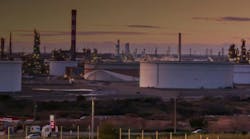Following agreement on two new oil service contracts, Iraq's oil minister said he expects his country to increase its oil production to 10-12 million b/d over the next 6 years from the current 2.5 million b/d.
"What we expect from the first bid round and what we hope for from the second round is that Iraqi production will be between 10 to 12 million b/d, and this will make Iraq equal to the world's biggest oil producers," said Hussein al-Shahristani, referring to one auction in June and another due in early December.
Al-Shahristani's remarks, which made no reference to the need to adjust production quotas set by the Organization of Petroleum Exporting Countries, came as international oil companies agreed to Iraq's financial conditions for investment in two major oil fields, Zubair and West Qurna 1, in southern Iraq.
The minister said a consortium led by Italy's Eni SPA had agreed to Baghdad's offer of $2/bbl for each extra barrel of oil it extracts on top of the current production of 227,000 b/d at the 4.1 billion bbl Zubair field.
Al-Shahristani said he wanted oil production at the field to increase by 1.125 million b/d within 6 years' time.
Meanwhile, the minister said that two competing consortia—one led by ExxonMobil Corp. and the other by OAO Lukoil—had submitted bids that met Iraq's conditions for the 8.6 billion bbl West Qurna 1 field.
"After a major effort from the oil ministry, our price was accepted, which is $1.90 per additional barrel," said al-Shahristani, adding that ExxonMobil proposed an additional 2.1 million b/d, while Lukoil offered 1.5 million b/d for the field, which now produces 279,000 b/d.
Al-Shahristani said that within 2 weeks the agreement would be completed with the Eni-led consortium, which is comprised of Sinopec, Occidental Petroleum Corp., and Korea Gas Corp.
The oil minister said it would also take two weeks to decide between the offers of the ExxonMobil-Lukoil consortia. ExxonMobil's consortium includes Royal Dutch Shell PLC, while Lukoil is in partnership with ConocoPhillips.
The two new agreements have improved the outlook for Iraq's oil and gas industry following the June auction when eight fields were offered to IOCs but only one of them, the 17.8 billion bbl Rumaila field, was awarded.
That field went to a consortium comprised of BP PLC and CNPC which bid $2/bbl produced to develop the Rumaila field with a production target of 2.85 million b/d, up from the current 1 million b/d.
The price demanded by all of the other IOCs in the June auction was at least twice as high—and in a few instances, almost 10 times higher—than what the oil ministry was willing to pay.
Combined with the BP-CNPC investment in Rumaila, al-Shahristani said the two new agreements mean that IOCs will invest $100 billion into his country's oil industry, with production set to increase by at least 6 billion b/d.
The minister did not detail the efforts that would be required to develop his country's industry so quickly, saying only that, "We do believe that it is a big leap in developing Iraqi oil fields."
More Oil & Gas Journal Current Issue Articles
More Oil & Gas Journal Archives Issue Articles

